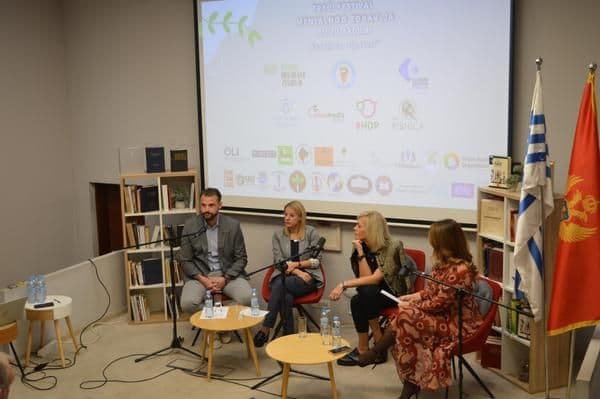Top Stories
Trust and Responsibility Take Center Stage at Mental Health Festival

The third edition of the Mental Health Festival in Montenegro opened with a panel discussion that addressed critical societal issues, highlighting the urgent need for trust and responsibility in a time when apathy is on the rise. With mental health often sidelined until crises emerge, the discussion provided a platform for meaningful engagement around these pressing topics.
The panel, titled “Do We Live Our Values or Only Call Upon Them When Needed?”, emphasized the importance of nurturing trust and a sense of community. Without these elements, effective mental health strategies are unlikely to succeed. The festival’s messages called for immediate action, urging attendees to embody the values they advocate rather than waiting for circumstances to dictate their actions.
Participants candidly discussed the troubling rise in anxiety, distrust in institutions, and the eroding sense of community. Citizens expressed their fatigue from injustice, and the dialogue reinforced the idea that solidarity should be viewed as strength rather than weakness.
Instead of offering quick fixes, the panel encouraged deeper introspection, posing questions such as, “Does our society genuinely live by its values, or do we invoke them only in moments of crisis?” and “Are solidarity and empathy foundational to our society, or have they become luxuries reserved for emergencies?” As these questions were raised, it was clear that the answers depend not only on systemic structures but also on individual actions.
This year’s festival focuses on three key values essential for the well-being of both individuals and communities: trust, social responsibility, and personal accountability. Experts, including psychiatrist Dr. Tea Dakic, psychologist Mr. Mina Gazivoda, and psychiatrist and psychotherapist Dr. Aleksandar Popovic, emphasized these themes throughout the discussions.
Dr. Dakic highlighted the correlation between trust and mental health, noting that communities with high trust levels often experience lower suicide rates. She explained, “Research indicates that in countries where trust is high, there are lower suicide rates and greater solidarity among citizens.” Conversely, she pointed out that in societies characterized by distrust, isolation prevails, leading to chronic stress, higher suicide rates, and a lack of engagement in preventive health measures.
She further addressed the perception of corruption and selective justice in Montenegro, stating that citizens often distrust institutions such as the healthcare system, police, and judiciary. “We have mental health strategies that are not implemented, action plans lacking budgets, and one of the highest suicide rates in Europe—almost double the average—without a coherent strategy in place,” Dr. Dakic remarked.
She posed a critical question: “Can we expect to cultivate a culture of trust in our society, or are we doomed to live in a cycle of distrust?” The implications of this lack of trust are dire; citizens who do not believe in institutions are less likely to seek help or report violence, perpetuating a cycle of suffering.
Mr. Gazivoda discussed the broader concept of social responsibility, arguing that it transcends professional titles and statuses. “The lack of accountability from one community member creates costs and harm to that individual over time,” he said. “Research shows that communities that foster trust and a sense of responsibility have more functional institutions and are more resilient in crises.”
Dr. Popovic introduced the concept of personal responsibility, outlining three pillars: responsibility to oneself, the responsibility to seek help actively, and the maintenance of mental hygiene as a lifelong process. He noted, “The first pillar, responsibility to oneself, often faces stigma, particularly internalized stigma, which can be a significant barrier in seeking help.”
The festival was officially opened by the Director of the Clinical Centre of Montenegro, Aleksandar Radovic, along with the Director of the Health Promotion Centre at the Institute of Public Health, Dr. Vilnerina Ramčilović. The discussion was moderated by psychiatrist Dr. Tijana Brandmajer.
The festival, which runs until October 20, will host events across six cities in Montenegro, with the highest concentration of activities taking place in the capital.
Mr. Gazivoda concluded with a powerful reminder of the collective responsibility to ensure that freedom does not descend into chaos. “Without an organized system, we risk allowing personal freedom to devolve into anarchy. We are the system, and it is our duty to cultivate an environment where equality is not a race to evade responsibility.”
The festival serves as a crucial reminder of the pivotal role that trust and accountability play in fostering not only mental well-being but also a cohesive society.
-

 Health2 months ago
Health2 months agoFiona Phillips’ Husband Shares Heartfelt Update on Her Alzheimer’s Journey
-

 Health1 month ago
Health1 month agoNeurologist Warns Excessive Use of Supplements Can Harm Brain
-

 World1 month ago
World1 month agoCole Palmer’s Cryptic Message to Kobbie Mainoo Following Loan Talks
-

 Entertainment3 months ago
Entertainment3 months agoLove Island Star Toni Laite’s Mother Expresses Disappointment Over Coupling Decision
-

 Entertainment2 months ago
Entertainment2 months agoMajor Cast Changes at Coronation Street: Exits and Returns in 2025
-

 Entertainment2 months ago
Entertainment2 months agoMasterChef Faces Turmoil as Tom Kerridge Withdraws from Hosting Deal
-

 World2 weeks ago
World2 weeks agoMassive Sinkhole Opens in Bangkok, Swallowing Cars and Causing Chaos
-

 World3 weeks ago
World3 weeks agoMichelle Tsiakkas Opens Up About Jamie Borthwick Before BBC Exit
-

 Lifestyle2 months ago
Lifestyle2 months agoEngland Flags Spark Controversy This Summer: A Cultural Debate
-

 Entertainment3 months ago
Entertainment3 months agoWoman Transforms Life with Boot Camp, Losing Nearly 9 Pounds in a Week
-

 World1 month ago
World1 month agoCoronation Street’s Asha Alahan Faces Heartbreaking Assault
-

 Entertainment3 months ago
Entertainment3 months agoColeen Nolan Reflects on Family Tragedy and Reconciliation









